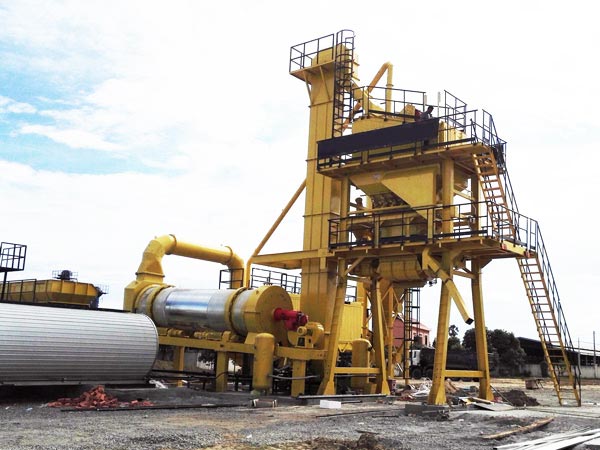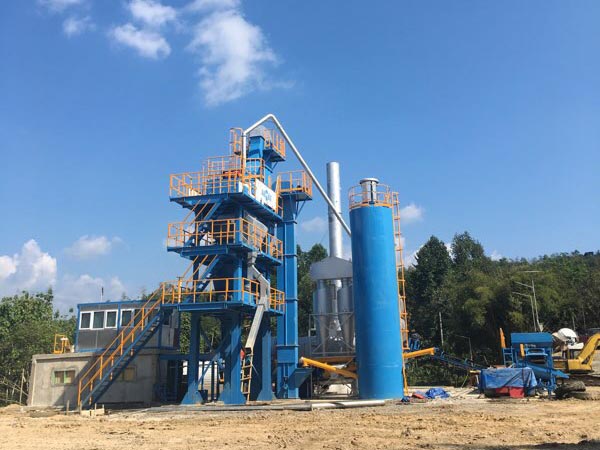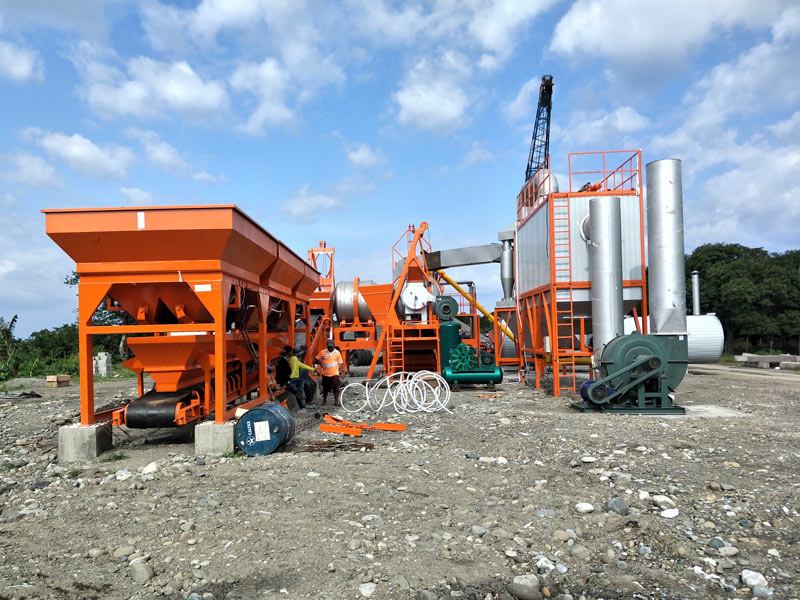Introduction: Understanding the Difference
Before diving into the setup process, it’s crucial to comprehend the distinction between a mobile asphalt plant and a fixed asphalt plant. Understanding their differences will help you make an informed decision about which type suits your specific needs.
Mobile Asphalt Plant vs. Fixed Asphalt Plant
Mobile Asphalt Plant:
A mobile asphalt plant, as the name suggests, is designed for mobility and can be easily transported from one location to another. This type of asphalt batch plant offers flexibility and versatility, making it ideal for temporary projects or situations where relocation is required.
Fixed Asphalt Plant:
A fixed asphalt plant is installed in a specific location and remains stationary throughout its lifespan. Stationary asphalt mixing plants usually have higher production capacities and are suitable for long-term projects or areas with consistent asphalt demand.
The Setup Process
Step 1: Site Selection
Choose a suitable location for your mobile asphalt plant that meets local regulations and environmental requirements. Consider factors such as access to raw materials, proximity to construction sites, and availability of utilities.
Step 2: Permits and Approvals
Obtain the necessary permits and approvals from local authorities before commencing the setup process. This typically includes environmental impact assessments, zoning permits, and compliance with noise and air pollution regulations.
Step 3: Equipment Procurement
Select reliable and high-quality equipment for your mobile asphalt plant, such as asphalt mixers, storage tanks, and material handling systems. Collaborate with reputable suppliers who can provide installation support and after-sales service.
Step 4: Infrastructure Development
Prepare the site by constructing a stable foundation to support the weight of the equipment. Install proper drainage systems to manage water runoff and prevent environmental issues. Consider erecting a weatherproof enclosure to protect critical components from adverse weather conditions.

Step 5: Electrical and Plumbing Setup
Engage qualified professionals to install electrical wiring, control panels, and plumbing connections for fuel and water supply. Ensure compliance with safety standards and conduct thorough inspections to minimize the risk of accidents and operational disruptions.
Step 6: Calibration and Testing
Thoroughly calibrate all equipment, including weighing systems and temperature controls, to ensure accurate asphalt mix proportions and consistent quality. Perform comprehensive tests to verify the functionality and performance of each component before starting production.
Step 7: Staff Training
Provide comprehensive training to your personnel on operating and maintaining the asphalt plant. Emphasize safety protocols, emergency procedures, and regular maintenance routines to maximize productivity and minimize downtime.
Step 8: Quality Control Measures
Establish stringent quality control measures to monitor and regulate asphalt mix specifications. Implement regular testing and analysis procedures to ensure adherence to industry standards and customer requirements.
Step 9: Environmental Considerations
Implement sustainable practices such as recycling of asphalt materials, dust control measures, and energy-efficient technologies to minimize environmental impact.
Step 10: Ongoing Maintenance
Develop a preventive maintenance plan and schedule regular inspections to identify and address potential issues before they escalate. Maintain accurate records of maintenance activities and equipment performance for future reference.
By following these steps and investing in proper planning and setup, you can establish a mobile and portable asphalt plant that meets your production needs while adhering to regulatory and environmental requirements. Remember to continuously evaluate and optimize your operations to achieve maximum efficiency and profitability.

The Difference Between Mobile Asphalt Plant And Fixed Asphalt Plant In Installation
In addition to the steps outlined above, it is essential to understand the difference between a mobile asphalt plant and a fixed asphalt plant. A mobile asphalt plant, as the name suggests, is designed for mobility and can be easily transported from one location to another. This type of plant offers flexibility and versatility, making it ideal for temporary projects or situations where relocation is required.
On the other hand, a fixed asphalt plant is installed in a specific location and remains stationary throughout its lifespan. Fixed plants usually have higher production capacities and are suitable for long-term projects or areas with consistent asphalt demand.
When building a mobile asphalt mixing plant, certain aspects require special attention. Here are some additional considerations:
Mobility Features: Opt for a mobile plant with robust chassis and trailer systems that allow for easy transportation. Ensure the plant is equipped with features like retractable axles, tow bars, and hydraulic support legs for stability during transit.
Compact Design: Mobile asphalt plants are typically compact in design to facilitate transportation and installation. Look for a plant that can be easily assembled and disassembled without compromising on performance and efficiency.
Integration of Components: The integration of components, such as aggregate storage bins, drying drum, and mixer, should be designed to minimize setup time and ensure smooth operation. Look for modular designs that allow for quick assembly and disassembly of plant components.
Energy Efficiency: Consider energy-saving technologies for fuel consumption optimization. Mobile asphalt plants often incorporate advanced burner systems, heat recovery units, and insulation measures to enhance energy efficiency.
Remote Monitoring and Control: Choose a mobile plant with remote monitoring and control capabilities. This enables real-time tracking of production data, fault diagnosis, and adjustment of operating parameters, enhancing overall plant management and performance.
Maintenance Accessibility: Accessible maintenance points and user-friendly design facilitate routine inspections and repairs, reducing downtime. Ensure the plant is equipped with safety features and clear maintenance instructions for the operators.
Building a mobile asphalt mixing plant requires careful selection of equipment, attention to transportation logistics, and consideration of site-specific requirements. By following these guidelines and understanding the distinctions between mobile and stationary asphalt mixing plants, you can successfully establish a mobile asphalt plant that meets your production needs while providing the flexibility to adapt to changing project demands.
